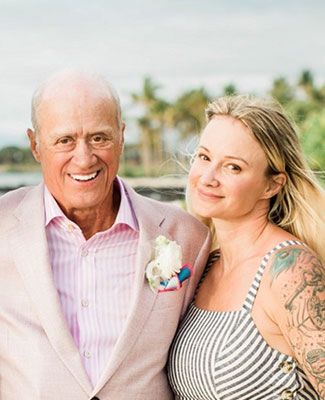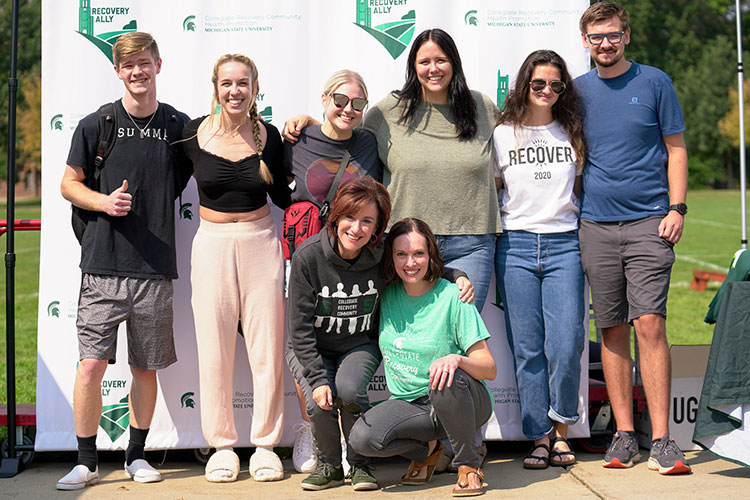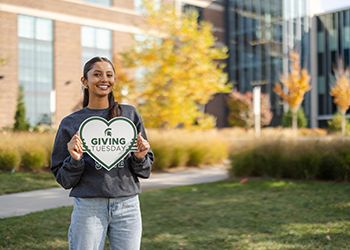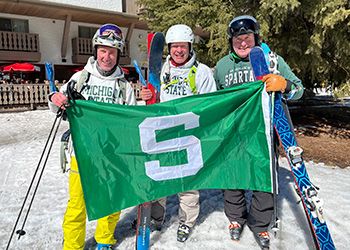The Ripple Effect of Persistence
How a community and philanthropy came together to support students in recovery

The Ripple Effect of Persistence
How a community and philanthropy came together to support students in recovery
March 23, 2023Being in recovery from alcohol or other drug addiction can be daunting. Starting an organization to help others in recovery, requires additional resolve.
Ten years ago, three MSU students stepped up to start a registered student organization—now called the Spartans’ Organization for All Recovery (SOAR)—as a way to support themselves and fellow students seeking recovery.
Over the past five years, thanks to community and philanthropic support, MSU has worked to expand its support to include a Collegiate Recovery Community—a thriving program that can provide the full depth of support students in recovery need to be successful.
Now, a recent $100,000 cash gift and a future $10 million estate gift from another committed individual, alumnus William (Bill) Piercey (pictured above with daughter Amanda), is ensuring the momentum for recovery support at MSU will continue.
Too often, student-initiated recovery programs flounder after a few years—the victims of too much leadership turnover, a lack of community awareness or simply budget constraints. MSU’s Collegiate Recovery Community, the CRC, is set to avoid those pitfalls. Critical infrastructure is already in place, including a fulltime coordinator, a 24/7 student lounge space and dedicated campus recovery housing.
Bill’s cash gift created two endowments that are adding to the impact—one supports the staff position and the other is providing funding for new programming. These endowments join previous endowed funds for scholarships and programming of the CRC.
We are one of the lucky ones in having this level of donor support. We are especially grateful to Bill Piercey. His support has solidified our program as a part of the university and helped us build community awareness of the importance of supporting students in recovery.
—Dawn Kepler, CRC Coordinator
The recovery community is estimated to be about three percent of students. Participants in CRC programming self-identify—with some who have come to MSU specifically for the support offered. The graduation rate of CRC participants is nearly 100 percent and they hold some of the highest GPAs as well.

Helping students in recovery successfully obtain an MSU degree was exactly what Bill had in mind with his giving.
He recalls his days at MSU as among his happiest. He majored in packaging, joined the Beta Theta Pi fraternity and made lifelong friendships. After graduation, he settled into selling cars in Southfield.
Growing up in Detroit, he didn’t envision a future as a Japanese car dealer. But after moving to California in the early 1970s, he saw the growth and potential in Honda. Eventually, he came to own and manage multiple dealerships. “They were fun to sell because of the quality,” he recalls, adding, “And I was always fairly good at what I decided to do.”
Throughout the years, he maintained his connections to MSU, particularly enjoying that his favorite Spartan celebrity—Earvin “Magic” Johnson—also became a Californian. “I think a lot of that guy,” says Bill. “He makes you proud to be a Spartan too.”
His gift to MSU reflects more than his Spartan pride however. Bill’s daughter Amanda struggled with substance use disorder as a young person.
That was terrifying. Bill recalls feeling helpless but eventually grateful that she found her way out, in part through the dedication of a skilled counselor. Amanda went on to found and manage a recovery clinic herself, which has grown to include several branches and has helped thousands to recover from addiction. The drive to be “fairly good” at what one decides to do, seems to have been handed down from father to daughter.
Bill is tremendously proud of Amanda and was delighted to find a way to support his alma mater that also honored her accomplishments.
“My hope is that this gift will help save lives,” he says. “Parents should support this and help it grow.”
LEARN MORE about supporting the MSU Collegiate Recovery Community by contacting Danielle Matlick, Associate Director of Development for the Office of Philanthropy for Undergraduate Education, at matlickd@msu.edu or by calling (517) 353-2116.




